- Home
- Sam Siciliano
The Grimswell Curse Page 27
The Grimswell Curse Read online
Page 27
“Now that really is nonsense,” I said.
Holmes was still smiling. “What he claims has a certain logic.”
“Oh, he feigns well enough.” Digby’s smile grew smug. “He acts as if old cupid has cleft his heart in twain, but I’ll wager all those pounds sterling are in the back of his mind. There are men who will kill for that kind of money—I am not one of them—but they do exist.”
“That is certainly true,” Holmes said.
Constance appeared both wary and puzzled. “I am not so sure.”
Digby cut up a strip of bacon into neat pieces. “I’ve heard you say enough bad things about Hartwood, Constance.”
“Oh, he’s not old Doctor Herbert’s equal, but I never said he was a murderer.” Her forehead was creased. “I shall have to think about this. A murderer. There is so much evil in the world. Maybe...” Her mouth formed a brief, grotesque smile. “My sister is always talking about the Devil being at work. Perhaps, after all, there is truth in what she says. So much wickedness.” She slowly stood up, then turned to leave.
She had almost reached the door when Digby spoke. “We must ask Rose whom she wishes to accompany her back to London—you or me. I’m sure the decision will be a difficult one for her.”
Constance gave him a venomous look, her pink face contorting with rage. Something about the white lace cap and black dress suddenly seemed ludicrous—they did not fit so large and powerful a person—and she appeared curiously sexless. It was a swinging door, or she would have slammed it shut behind her.
Digby’s pale blue eyes glared triumphantly at the door. “Pathetic old cow. She is ultimately rather laughable.”
Holmes stood. “Would either of you care for coffee?”
I shook my head, but Digby nodded. “Please.”
Holmes returned with two cups of coffee. “So you still have hopes that Miss Grimswell will marry you?”
His mouth full, Digby nodded. “I do, Mr. Holmes, I do. And I shall protect her, rest assured of that. And if you find this monster—especially if you expose him as Hartwood—you will be well paid.”
Holmes’s smile was cold. “My payment is of little concern to me, not in this case.”
“No?” Digby’s plate was clean at last, and he set down his napkin. “Why not? If I marry Rose, I shall see that you are well paid.”
“I shall keep that in mind.”
“Do so. Especially now, given all that has happened... Rose must understand that marrying me is the only thing that makes sense. I can get her away from Grimswell Hall and Constance, and I can protect her from that murdering fiend. I may not... I may not be good for much—I know you both think me a pretentious fool—but I am capable of that, and I do love her, in my own way. Wild, passionate abandon is not my style, howlin’ at the moon and goin’ down on the knees and all that, but my feelings for her are genuine, all the same.” He took a sip of coffee. “And even if... Certainly I can offer her more than some country-bumpkin doctor. She is a woman of intelligence and education, and what would she talk about with him? Farmer Brown’s gout? Sheep herding? She’d be bored to death in a month.”
I had shown incredible restraint, but I spoke at last. “Do you truly feel you know Doctor Hartwood well enough to speak with such certainty about his character?”
He shrugged. “Oh, I know the type well enough. The species is a common one.”
“And exactly how would you know his type?” I asked. “You do not associate with any men who have to work for a living, men who actually do some active good in the world.”
My anger caught him off guard. “I mean no criticism of physicians, Doctor Vernier. Your calling is a noble one—if a man has the stomach for it.”
This was too close to my own reflections. My head had begun to ache, and I could bear Digby’s presence no longer. I mumbled my excuses, stood up and departed. Holmes soon joined me in the great hall. I was again staring out of the mullioned glass at the trees; an icy-looking drizzle had begun to fall, something between mist and rain.
“Not very inviting,” Holmes said. “Unfortunately I must be going out. Keep an eye on the ladies, Henry.”
“Where are you going?”
“To Grimpen and then to Merriweather Farm. Someone needs to alert the local police of Mrs. Neal’s death. I shall go on horseback.”
I could not repress a shudder. “Wild horses could not drag me back to Merriweather Farm.”
“I do not look forward to it myself. The ladies, I believe, are in the conservatory.” My eyes were still fixed on the dark green leaves of the yews amid the white mists, but I heard him sigh. He set his hand on my shoulder. “Thank you, Henry, for your help. Murder never fails to shock—never.”
I soon joined Michelle and Rose by the fish pond. Michelle was relentlessly cheerful, but Rose seemed as despondent as I, and rather preoccupied. The huge koi swam about in the clear blue water, their colors striking against the blue tiles, but even they seemed faintly monstrous to me with their grotesque, hungry mouths.
Later, after lunch, I sat near the fire and tried to read a medical journal. That was a mistake, as I was far too restless. After reading the same paragraph several times, I let my head fall back against the chair. It would be good to get back to London and some semblance of normality. Suddenly sleepy, I closed my eyes.
I had nearly dozed when soft, languid music filled the hall, the notes played beautifully. The piano—someone was playing the piano, the grand piano which had sat in a corner silent and unused during our entire stay thus far at Grimswell Hall. I opened my eyes and leaned forward. The top was up, and Rose stared down at the keys, the tension of her concentration showing in her forehead and her tight lips and jaw. The piano was black, as was her dress and her hair, but her face stood out in the shadow.
The music sounded like Chopin, probably one of the Preludes, the left hand carrying the urgent melody. Her playing was quite remarkable, very clean and lucid, but with a passion one would not expect from a twenty-year-old woman. I listened in awe for the next several minutes as she went through what must be the whole set of Preludes. She played it with a simple sincerity that was impossible to resist.
At some point Michelle joined me, setting her hand on my shoulder and standing quietly beside me. When Rose finished one particularly beautiful piece, Michelle stared down at me, her eyes all liquid, and said, “She must play well.”
I smiled. Because Michelle had little musical knowledge or experience, she usually deferred to my judgment, although I was hardly an expert, especially compared to Holmes, an excellent violinist and an avid concert- and opera-goer.
“She plays magnificently.”
“The music is lovely, but so sad.”
“It was written by a tubercular Polish romantic who died very young.”
“I hope...” Her fingertips caressed my cheek lightly. “I hope that is not why she chose it.”
When Rose had finished the Chopin, she started on a lengthy sonata which was either Beethoven or Mozart. The music sounded more difficult with many more notes, but she gave it the same ardent intensity. She then went backward in time and played something by Bach, more difficult still, with three or four contrapuntal voices. The finale was a piece by Chopin which I recognized, a thundering polonaise filled with dramatic chords played with both hands. She used the pedal and filled the entire hall with sound.
In awe, I stood up and stepped around where I could see better. Her hands had been hidden from me, but now I saw them leap about, those long white fingers totally mastering the keys, the pale skin of her wrists almost glowing next to the black silk of her cuffs. Her eyes showed both wild exultation and tremendous concentration. The final chord was deafening, all the strength of her strong arms and shoulders going into her fingers.
“Oh, bravo!” Michelle began to clap.
“Bravo indeed,” I said, joining her. “Bravo.”
Rose drew in her breath, her bosom swelling, blinked twice, then glanced at us and smiled. “Thank you.�
�
Digby came walking out of the shadow where he had stood near a gigantic potted palm. “That was remarkable, Rose. I knew you played, but... I guess I’d never heard you, not in years and years, and I thought...” His smile was almost awkward, his eyes evasive. “That was so damned authoritative, nothing of the amateur at all. And you played for so long, nearly two hours. I kept waiting for it to end—not that I really wanted it to—but... Are you finished, by the way?”
She smiled up at him. Her brow glistened faintly with sweat. “Yes, I think so. I had not played in a long time. I wanted to do something which would... distract me. My fingers felt awkward. I must get back to a regular practice schedule again.”
Digby’s eyes were fixed on her. “I didn’t know,” he said, almost to himself.
“Are you ready for tea, my dear?” Michelle asked. “You must have worked up an appetite playing that way.”
“Tea would be nice.” She stood up and wiped her brow with her fingertips. She glanced at me.
“It was very good, Rose,” I said. “You play beautifully.”
She smiled at me. “Thank you, doctor... Henry.” Her eyes still seemed somehow weary and troubled, despite her obvious pleasure in our admiration.
Michelle took her arm. “The tea should be in the sitting room by now.”
I glanced down at the music on the piano. The thick book of Beethoven sonatas made one of the pieces obvious. Their footsteps echoed through the hall, but I lingered at the piano. The clouds had broken at last, and a shaft of tentative yellow light slanted down through the vast hall.
My eyes rose. Constance stood clutching the oaken railing running along the gallery above us. All in black, she and Rose were dressed almost identically, except for Constance’s lace cap, but while Rose had a majestic beauty, Constance appeared almost monstrous, and as I had remarked before, curiously sexless. She smiled reflexively at me, then started along the gallery.
I sighed, then looked about and saw another silent spectator— Sherlock Holmes standing near the entranceway. I strode across the hall, my own footsteps echoing now.
“You are back. Did you just arrive or did you...?”
He smiled, then pulled off his gloves and put them into his hat. “I heard the end of the Beethoven, the Bach and the polonaise. Classical, baroque and romantic, the entire gamut. Her playing is extraordinary, quite sublime for one so young. She has a phenomenal talent. Those remarkable hands of hers will surely not go to waste.”
“Even Digby seemed impressed. Perhaps he finally realizes she has something more to offer than a mere fortune. And how was your unpleasant business?”
Holmes’s mouth stretched into a grim line. “As ugly as might be expected. The local representatives of the police came with me, and Doctor Hartwood.”
“Hartwood?”
“He is the only physician in the area, and the police rely upon his assistance. In this case, cause of death was obvious. Hartwood has a strong stomach, but he said he had never seen evidence of so horrific a death. The young constable who accompanied us became quite ill. And, of course, the entire village is abuzz with gossip. Neither money nor threats will get anyone in Grimpen to venture onto the moor near Grimswell Hall after dark. There is probably an even division between the proponents of a vengeful ghost and those of a werewolf.”
I tried to smile but could not. “Back in London, before all this had happened, it was much easier to ridicule such talk.”
“And as I have said repeatedly, a mortal man can be as frightening as any fictional monster.” He turned to gaze out the window. “Now that my journey is done, the rain has ended. The sun is out, but it has turned dreadfully cold.”
A feeble yellow light showed amid the dark trunks of the trees, but a remnant of the mists, that almost tangible air, still softened their silhouettes. The sun seemed very far away.
Dinner was a gloomy, formal affair, we men all in our black tail coats with white shirts and bow ties. Digby was the only one who appeared in good spirits. Even Michelle had grown somber. Digby chattered on, while Constance glowered at him and Rose intermittently attended to his words. Constance had insisted on supervising our “last meal,” and Mrs. Fitzwilliams had apparently felt too weary to object. The meat was badly overcooked and barely edible. Digby would not touch it, and the rest of us ate a little to be polite.
After the main course had been cleared, Maria wheeled in a cart and began setting bowls with large baked apples before us. They smelled wonderfully of apple and cinnamon, and their hollowed centers had some dark pungent filling.
“The meat may have been a trifle overdone,” Constance said, “but the apples are perfect. I made the mincemeat myself, Rose.”
Rose smiled and stared down at her apple. Brown cinnamon could be seen sprinkled along the top, the mincemeat with its abundance of raisins piled exceptionally high. A notch had been cut in the apple, a very slight line going from the center to the wrinkly skin. “I am not very hungry tonight.”
Constance grew mournful. “But I made the mincemeat especially for you—I know it is your favorite.”
Rose plunged her spoon into the center and took a big scoop of the mincemeat. “It is very good.”
The rest of us also began. The mincemeat had nuts and spices besides the raisins. “This is delicious,” I said.
Constance glowed at our praise. “Thank you. It is an old family recipe.” She enjoyed her own cooking, for she devoured her apple quicker than anyone else, all save Holmes, who had not touched his.
“Don’t you care for baked apples, Mr. Holmes?” Constance asked.
“It appears quite delicious, but my stomach feels somewhat unsettled. I must regretfully pass. Perhaps tomorrow morning, before we depart.”
Rose had eaten about half the apple and set down her spoon. Constance watched her. The light from the tall white candles in the silver holders cast a flickering golden glow across the white linen tablecloth, the silver settings and the crystal glassware. Rose’s hand toyed with the spoon, which seemed tiny alongside her large white hand. Her blue-gray eyes stared into space, her thoughts obviously elsewhere.
“Is it cooked through?” Constance asked.
Rose frowned, her thick black eyebrows coming together. “What?”
“Your apple. Is it cooked enough?”
“Oh, yes.” Rose began to eat, her eyes watching her aunt.
Constance reached forward and took a piece of hard candy from a bowl, then her lips puckered slightly as she sucked upon it. Rose finished the apple and set down her spoon. She and Constance stared at one another. The frown reappeared on Rose’s brow, a troubled look in her eyes, while Constance continued smiling, the smile odd because her mouth was full.
Constance swallowed, then opened her mouth in a gasp. “Uh,” was all that came out. “Uhh.” She stood up, her massive hands pawing wildly at her throat, even as her face darkened. I stood, but Michelle was faster. She threw down her napkin, stood, took two steps nearer, then her arm swung round and her hand struck Constance squarely between the shoulder blades. The piece of candy burst from Constance’s mouth and made a piercing ping against a glass. She drew in her breath, coughed once, and breathed loudly.
Michelle handed her a glass of water. “Drink this.”
Constance’s face began to return to its normal color. “Thank you, doctor.”
Michelle frowned. She was wearing a beautiful blue gown, one which left her shoulders and long neck bare. “Hard candies should be banned. People can choke to death on them.”
“You saved my life,” Constance said. “I’d have choked to death for sure. I’m very grateful.”
Michelle nodded. We all sat back down. Rose still had a troubled look. Holmes was staring at her, his mouth and eyes grim. The fingers of his hand drummed upon the tablecloth, a half-inch of white cuff showing below the black woolen sleeve of his tail coat. I thought he was staring at Rose, but perhaps it was only at the empty china bowl before her.
Fifteen
We sat together sipping brandy or port, the room heavy with the odor of burning wood, on what I hoped would be our last evening in Dartmoor. It was clearly a man’s room: the massive furniture was made of dark oak and red leather, paneling of a similar dark wood rose to the wainscoting, and the carpet was another crimson hue. Everything seemed suffused with a faint tobacco smell.
Digby and Rose were on the sofa, both in black, he with the white front of his shirt and tie, the thick cigar which he had demanded dangling between his slender fingers, a glass of cognac in the other hand. He talked incessantly while she stared down at the arm of the sofa, her white hands moving restlessly about on her lap. Fitzwilliams, also in black, stood in a corner watching like some aged, weary hawk to see that nothing was amiss. Constance held a tiny glass of port in her immense hand and spoke to Holmes, whose eyes restlessly wandered the room like caged beasts.
Michelle set her hand on mine. “What is wrong, Henry?”
I shrugged. “I still feel shaken. Pardon me, I must make dreadful company. You look so ravishing in that dress. The light gives your bare arms and shoulders a rosy glow. How I wish...”
“Hush.” She stroked my hand. “Soon, I trust, we will be home together in our own bed.”
I felt a familiar longing, and I put my arm about her. “We have certainly had little time for one another of late.”
Rose sat up abruptly, her lips parting, eyes widening, as she put her hand over her bosom. Although the firelight made it harder to see, her face paled. Digby did not notice, but Holmes leaned forward in his chair.
Michelle’s petticoats rustled under the silk as she stood. “Rose, are you ill?”
Rose closed her eyes and swallowed once. “I... I am only tired.” Her eyes opened and gazed into the fire. “Perhaps... I shall retire for the evening.”
Digby set down his brandy, then withdrew his gold watch with a great flourish. “But it’s barely eight, Rose.”

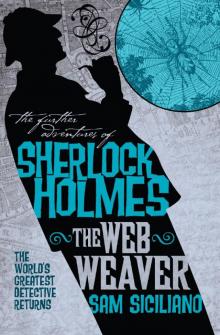 The Web Weaver
The Web Weaver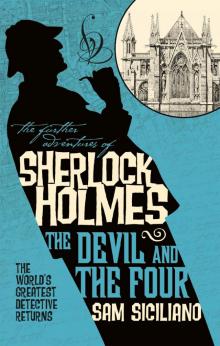 The Further Adventures of Sherlock Holmes--The Devil and the Four
The Further Adventures of Sherlock Holmes--The Devil and the Four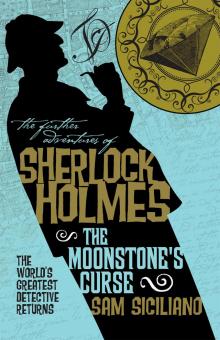 The Moonstone's Curse
The Moonstone's Curse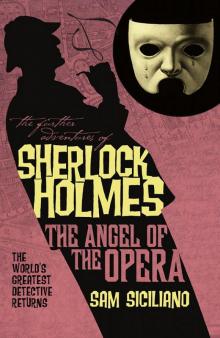 The Angel of the Opera
The Angel of the Opera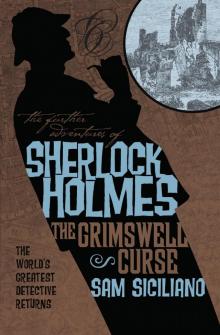 The Grimswell Curse
The Grimswell Curse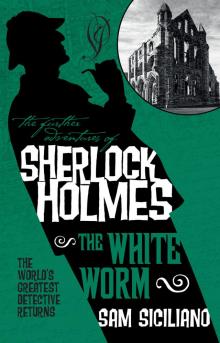 The White Worm
The White Worm